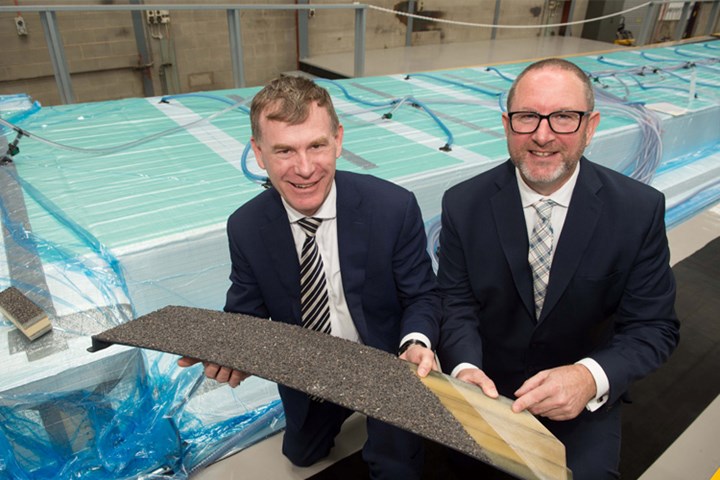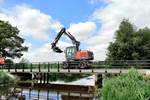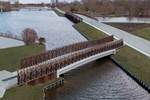National manufacturing center for FRP infrastructure opened in Australia
Four-year program between Sustainable Infrastructure Systems, InfraCore leads to internationally certified composite bridge, jetty, wharf, pontoon and lock gate manufacture, research in recycled materials.

SIS launch of new manufacturing facility. Photo Credit: SIS
As reported by The National Tribune, on Sept. 2 a new facility was opened in Wingfield, South Australia, to commence the manufacture of damage-tolerant fiber-reinforced polymer (FRP) composite structures, including road/pedestrian bridges, jetties, wharves, pontoons and lock gates. According to a statement from Sustainable Infrastructure Systems (SIS, Wingfield), the opening was the result of a four-year program of technical collaboration with Dutch firm InfraCore (Rotterdam, Netherlands), a specialist in FRP composite infrastructure. With up to 15 new hires expected in its first 12 months of operation, supporting employment growth, the facility is also expected to generate trade opportunities.
According to AuManufacturing, products patented by InfraCore have been licensed to SIS for the Oceania Region. Significant investments had also been made in research, SIS says, to enable the use of recycled waste elements in the FRP structural decks. InfraCore says more than 1,400 structures, from pedestrian walkways to high-volume traffic and harbor bridges have been installed in the Netherlands, Belgium, Poland, England, France, Italy, Sweden, Norway, China, Canada and the U.S. using its FRP technologies.
“There are many advantages of low-weight FRP bridges, including minimizing on-site safety risks as the construction of bridge elements occurs in manufacturing facilities,” SIS associate director, engineering, Luigi Rossi, says. “Being controlled environments, there is much less that can go wrong when it comes to safety. The next advantage comes by reducing the disruption to surrounding road or rail infrastructure during installation. Off-site production gives more predictable costs and minimizes complications that can arise on a construction site. These FRP bridge elements are virtually maintenance free which assists stakeholders manage long term budgets.”
The first pedestrian bridges for a local commercial customer were finished in April for a contract with Laing O’Rourke for the NSW Government’s “More Trains, More Services” development program.
Related Content
-
Novel composite technology replaces welded joints in tubular structures
The Tree Composites TC-joint replaces traditional welding in jacket foundations for offshore wind turbine generator applications, advancing the world’s quest for fast, sustainable energy deployment.
-
Microwave heating for more sustainable carbon fiber
Skeptics say it won’t work — Osaka-based Microwave Chemical Co. says it already has — and continues to advance its simulation-based technology to slash energy use and emissions in manufacturing.
-
CirculinQ: Glass fiber, recycled plastic turn paving into climate solutions
Durable, modular paving system from recycled composite filters, collects, infiltrates stormwater to reduce flooding and recharge local aquifers.













